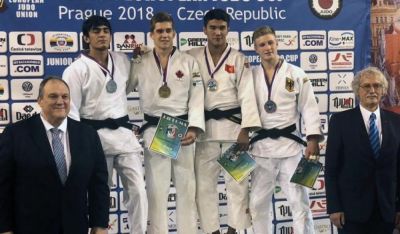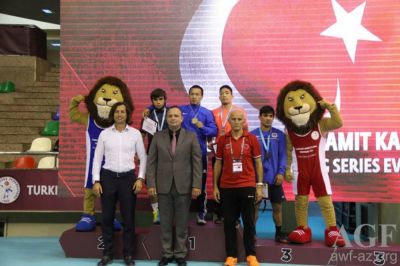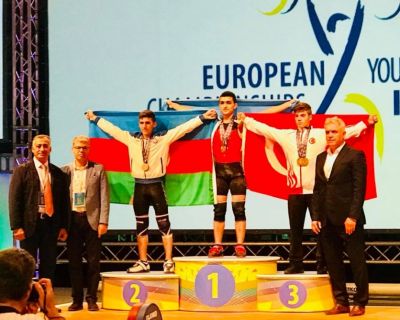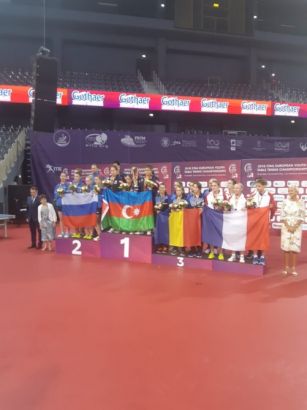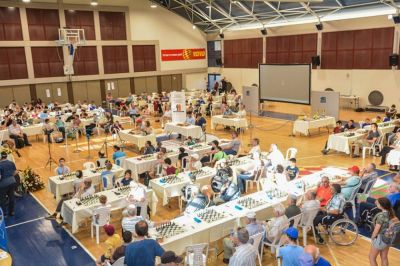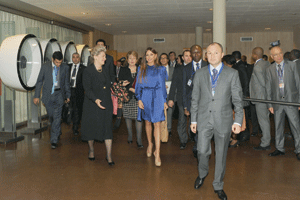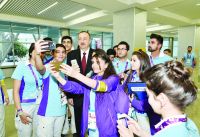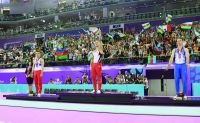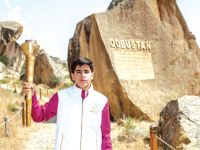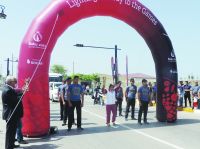First Lady of Azerbaijan, president of Heydar Aliyev Foundation, UNESCO and ISESCO Goodwill Ambassador Mehriban Aliyeva participated in the 36th meeting of UNESCO`s General Conference in Paris.
Mrs. Aliyeva was welcomed by UNESCO Director-General Irina Bokova.
Delegations from 193 member states, heads of state and government, as well as observers for non-member states, intergovernmental organizations and non-governmental organizations (NGOs) are attending the session.
President of the 36th session Katalina Bogyay of Hungary opened the event and spoke of issues on the agenda. She noted the General Conference will decide on UNESCO`s proposed program and budget for the 2012-2013 biennium. The agenda also features discussions on sustainable development, culture of peace and non-violence, with a special emphasis on gender equality, Africa, youth, Education for All (EFA).
Speaking in the session, Chairperson of the UNESCO Executive Board Eleonora Mitrofanova drew the participants` attention to poverty reduction, illiteracy problems. She updated the attendees on UNESCO`s activities towards gender equality provisions.
UNESCO Director-General Irina Bokova, in her opening address to the Conference, stressed the need to reinforce cooperation in the face of the challenges confronting the world today. She pointed out that the stakes of peace and sustainable development today, lie precisely in education, the sciences, culture, and knowledge sharing. All of this call for more and better UNESCO.
Leaders` Forum on the theme "How does UNESCO contribute to building a culture of peace and to sustainable development?" is also held as part of the session. Attending the event President of Hungary Pal Schmitt, President of the Republic of Gabon
Ali Bongo Ondimba, President of the Republic of Cote d'Ivoire Alassane Ouattara, Prime Minister of Grenada Tillman Thomas and Pascal Irene Koupaki of Benin underlined the importance of the Forum.
Addressing the Leaders` Forum First Lady of Azerbaijan said:
"Ladies and gentlemen,
Dear forum participants,
I wholeheartedly welcome all participants of this forum. There is hardly a person having something to do with politics, science or culture who can remain indifferent to the theme of our forum. Indeed the future of humanity can hardly be imagined without building a culture of peace and ensuring sustainable development.
Today we live in a very complicated world. On the one hand it is characterized by the introduction of new technologies, advances of modern science. We seem to be on the right path of building a knowledge-based information society and economy. This means that if natural resources and natural capital once used to be the only source of wealth, now as the only initiator of new ideas and technologies, human being himself becomes a new source of wealth. And unlike resources and capital, human mind is inexhaustible. It is thanks to this phenomenon that the perception of goals and objectives of UNESCO has changed. The term "human capital" is no longer a metaphor. Intellect and wealth can go hand in hand...Steve Jobs is a brilliant example.
But on the other hand, one does not even need to browse the internet to realize that the world is experiencing a severe financial crisis. Many scholars suppose that these are just outward signs of a more serious systemic crisis, which has much to do with a consumer society.
It seems that the accelerating pace of globalization is making us all the residents of a global village, gaining an unprecedented control over space and time. But unfortunately, we are divided like never before. If several years ago anti-globalists and alter-globalists were something exotic and were heard of only during high-level summits, latest events covering a wide geography from New York to Tokyo testify to the fact that economic problems have affected the whole lot.
International organizations are adopting different declarations such as Declaration on Social Justice for a Fair Globalization, while transnational corporations are seeking cheap labor force. Having its own severe laws, the world of economy is constantly demonstrating how far it is from the ideas of social justice and global ethics.
There is a wide range of economic theories and models of development. However, I`m sure that it is human being who must always be the main focus of our attention no matter what part of the world he lives in and no matter what culture and confession he belongs to. We must invest our efforts in guaranteeing that by exerting himself human being can ensure his welfare and give his loved ones a better and safer tomorrow.
Many international organizations, including the United Nations have adopted relevant declarations outlining the goals and priorities of our common future. Nevertheless, the outcomes of the first decade of the third millennium give no grounds for optimism.
Challenges of the 21st century were also high on the agenda of a recent Baku international humanitarian forum. To some extent the forum provided an insight into many questions raised today in this hall. The forum featured discussions on such issues as "Multiculturalism: accomplishments and problems", "Modern technologies that change the world", "Convergence of sciences", "Biotechnology and ethics problems", "Humanitarian aspects of economic development model", "Social media" and high technologies" and "Traditional systems of values in post-modernist society". The forum participants adopted the Baku Declaration, urging international organizations, including UNESCO "to create realistic frames for intercultural, inter-confessional and inter-civilizational dialogues as the conditions of preserving and further positive development of mankind, exposing for all this, first and foremost, the common character upon keeping the diversity of cultures and systems of values". And this, of course, is the fundamentals for building a culture of peace.
The forum participants, who represented 39 countries and international organizations, attempted to draw the international community`s attention to humanitarian problems of nowadays. A civilizational crossroads, Azerbaijan in fact put forward an initiative to set a new humanitarian agenda.
I look forward with optimism. Twenty years ago we could not forecast that an information technologies boom would have transformed our life. Today some already pin hopes on emergence of new resource-efficient technologies, which would help prevent a resource collapse, once forecast by the Club of Rome. Perhaps this will happen. However, there are questions which require an adequate response for the sake of our sustainable development. For example, should we be constantly seeking the maximization of our economic growth? Maybe, we`d be better refraining?
Apparently, a new world order is already forming, and the process will be accompanied by a flurry of complications. First and foremost, it is the contradiction between "a real human being", motivated by his own interests, and "an ideal human being", guided by the ideas of humanity and sympathy towards all living things on earth. I think that the humanitarian aspects of globalization have now taken an unprecedented topicality. In this sense, realizing our responsibility for the fate of human civilization is of essence. Otherwise, our common "tomorrow" will never come.
Thank you for your attention."
The General Conference will begin work on the Organization's next Medium-Term Strategy for 2014-2019. It will see discussions on Palestine, as well.
Another highlight of the session will be a special plenary meeting on 2 November devoted to the celebration of the 10th anniversary of the adoption of UNESCO's Universal Declaration on Cultural Diversity.
{nl}
AzerTAc
{nl}
{nl}
{nl}
© İstifadə edilərkən "Xalq qəzeti"nə istinad olunmalıdır.




